Best practice examples for the general public
In our first subchapter you can find general offers and projects to raise awareness for Lifelong Learning among all people but with a special focus on adults who are remote from education. Beside broadly based approaches for the general public we found very interesting projects for special target groups like young people, persons working with illiterates or men in rural areas who are at risk of social exclusion. The projects stand out because of their high transferability to other countries, target groups and topics.
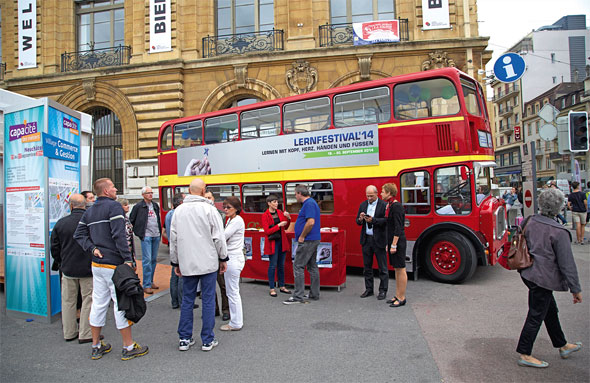
ABOUT THE PROJECT
The Lernfestival (Learning Festival) is a national awareness campaign for Lifelong Learning and aims to bring a new learning experience to people in Switzerland. It takes place for 24 hours once a year and wants to creatively motivate people to participate in further education and to think about Lifelong Learning. Therefore, locally organised Lernfestivals take place all over Switzerland. In 2014 it were 448 events at 36 different places. The SVEB (Swiss Federation of Adult Education) is the national coordinator of the Lernfestival and prepares material (e.g. poster, flyer, programmes) that can be used for free by the local organisers. The events offer low-threshold learning opportunities for the participants. To support the local organisers, the SVEB offers workshops on topics like communication, project management, media and networking. All events during the festival are for free.
TARGET GROUP
At the Lernfestivals they want to reach the broad public and especially adults who are remote from education. The festival shall bring together further education providers, labour market officials, politicians, regional stakeholders, and of course the general public with special focus on adults who are remote from education.
AIM
The Lernfestival aims at creatively motivating people to participate in further education and to think about Lifelong Learning. The events offer low-threshold learning opportunities for the visitors so that they can enjoy informal as well as formal further education. Another useful aspect of the Lernfestival are the many networking opportunities for various stakeholders in the educational sector.
METHOD/APPROACH
Adding to the general method described above, they actively try to involve the target group by offering very low-threshold learning opportunities at the Lernfestival. In order to involve people in the events they have various prize competitions as for example “Superbrain”, “Educational Landscape” or “Star Walk”. As an innovative outreaching method they have implemented the “BeratungsMobil” into their concept. They take a bus to different cities where Lernfestivals will take place and try to reach people on the street. The bus is a red London bus and attracts people’s attention. There, they offer low-threshold further educational guidance and people can actively try to do something with their hands and learn at a very low level. Circus artists are there as well to attract people’s attention.
IMPLEMENTATION/TRANSFERABILITY
The idea of the Lernfestival can be easily transferred to other countries or other target groups. Online there are various materials on the project, checklists, as well as practical tools. It is always great if not only further education institutions but also companies, museums and libraries can participate in the Lernfestival, in order to present a wide range of learning opportunities to the public.
WHY IS IT SPECIAL?
The Lernfestival is a flexible concept with low-threshold implementation, which can be utilised in various educational settings. It is also a cost-effective way to bring attention to Lifelong Learning. Furthermore it tries to integrate learners creatively with varying events involving prize competitions and through outreaching activities provided by the “BeratungsMobil”.
CONTACT AND FURTHER INFORMATION
- SVEB – Schweizerischer Verband f. Weiterbildung
Mr. Graemiger
Telephone: +44 319 71 61
- ➜ bernhard.graemiger@alice.ch
- ➜ www.alice.ch/de/lernfestival/different
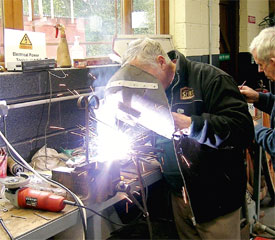
ABOUT THE PROJECT
Meath Partnership, through their community based activities, became aware that community groups were predominantly comprised of women and that there was a significant lack of social outlets in which older men could engage, particularly those men living alone in rural areas. In 2006 the partnership looked to the Australian model of Men‘s Sheds. According to Professor Barry Golding, a patron of Men's Sheds from Australia, men talk shoulder to shoulder rather than face to face, finding it easier to interact and disclose their experiences, issues and needs through a shared activity. This is a free programme to which local men can join at any time. It is a programme for sharing skills, ideas, and engaging in common activity. It is aimed at creating a support group for men who may find themselves isolated within their communities. Activities include things such as game playing - cards, chess, classes - computer skills, Pilates, activities – restoring old farm machinery, furniture making, and field trips. The Irish Men’s Sheds Association was set up in January 2011 with the purpose of supporting the development and sustainability of Men’s Sheds on the Island of Ireland.
IMPLEMENTATION/TRANSFERABILITY
This model was originally developed in Australia and transferred very successfully to Ireland. The model has great potential in any rural and village areas of any country where there is a need to bring people together. It has recently been transferred to the UK where there are now 16 sheds. Both the Irish and UK Men’s Shed associations provide guidance on how to set up a shed through area advocates (Ireland) and a guide on the website (UK). The sheds can be resourced trough membership charges and/or fundraising. What’s needed will depend on the set-up and activities, for example a group may or may not need to pay rent on a facility.
WHY IS IT SPECIAL?
Men's Sheds are established around some common shared interest, often activities relating to arts, crafts and technical skills, the kind of things done in the backyard shed. However, rather than working on those interests alone, they are worked on in a community shed thereby introducing social interaction among the participants that is an important part of their health and well being. In a time of austerity sheds have given unemployed men a purpose and a support network they might not otherwise have. Sharing skills gives the men a sense of achievement and also makes them feel like they can contribute to something. Sheds also supply a place to go to socialise which doesn‘t cost as much as a pub visit would.
CONTACT AND FURTHER INFORMATION
- ➜ www.menssheds.ie
Telephone: +353 051 448 725 - ➜ www.menssheds.org.uk
- ➜ contact@ukmsa.org.uk
Mike Jenn: Telephone: +44 7757 024749 - ➜ www.meathpartnership.ie
Kay O‘Conner: Telephone: +353 46 9280 790
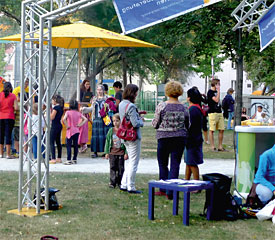
ABOUT THE PROJECT
»chillen – action – beraten« (en., »chill – action – counsel«) takes place in the parks of Vienna during the summer months. The target group comprises young adults (with educational disadvantages) and their social environment (family, friends, acquaintances). The events offer a chill area that invites you to stay and browse through informational material, an action area where skills and competences can be made visible, and a counselling area. At the counter, individual questions concerning orientation, education, training, work, (financial) support, etc. are answered. Besides the cosy seating area, the action area is the main attraction; this area offers, for example, a mobile bike repair shop, a mobile graffiti wall, and a slackline to train one’s balance and other skills. Of course there is also a sound system, which can be used by participants to play “their” music – and the music that is being played is just as diverse as the people that participate in the event.
IMPLEMENTATION/TRANSFERABILITY
The concept aims at finding places where young people like to spend their time and then addressing them in “their language”, taking their interests and skills into consideration. Through close collaboration with the people in charge of the parks (open youth work), the right places can be selected and the events can be advertised efficiently and effectively. At the same time, flyers and informational material is being distributed during these events, actively addressing the target group. This “actively entering the public space”, and the active establishment of contact, reduces scepticism and reticence. Great emphasis is laid on networking as well as the utilisation of synergies, which means that a lot of dissemination work is done.
WHY IS IT SPECIAL?
Over the years, the target group in the park has been expanded. The events now address all groups of park visitors: people with supervision jobs, people with migration backgrounds, elderly people, etc. The activities and materials offered were also expanded accordingly. With the aid of various “door openers”, the wish for further developing one’s personal and vocational perspective and a drive for learning and for (higher) qualification, should be inspired. The organisation of events in collaboration with regional youth workers has proven to be especially advantageous. The youth workers keep the younger children busy with games, painting activities and similar treats, so that the young adults can make “more undisturbed” use of the educational and vocational counselling offers.
CONTACT AND FURTHER INFORMATION
- Werkstaetten und Kulturhaus
Bildungsberatung in Wien
Mag.a (FH) Ursula Koeniger
Telephone: +43-6991-401 21-95 - ➜ ursula.koeniger@wuk.at
- ➜ www.bildungsberatung-wien.at
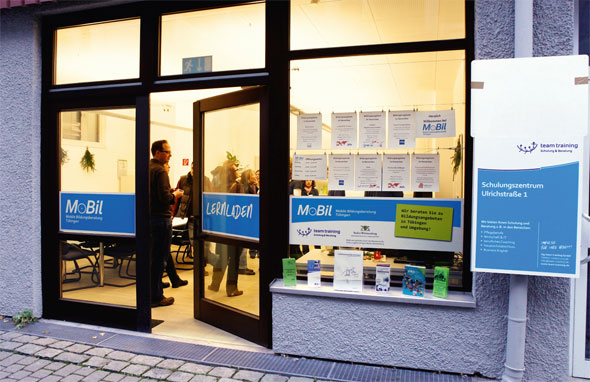
ABOUT THE PROJECT
MoBil – Mobile Bildungsberatung in Tuebingen - is a project funded by the Ministry of Culture, Education and Sports in Baden-Wuerttemberg/ Germany. The main idea of MoBil is to increase the number of people who take part in Lifelong Learning and especially to reach those ones who don’t participate in any further education yet. MoBil offers the chances to find new ways to get connected with people, to meet the target group, and to find the target group’s needs.
TARGET GROUP
MoBil wants to reach people who are remote from further education – for very individual reasons. This includes low achievers, people with low educational background and people who need government- funded aid, as well as any other person who might be interested in further education.
AIM
The aim of MoBil is to increase the number of participants in further education and to raise the number of elderly learners. Participants shall be supported and encouraged in Lifelong Learning. MoBil also wants to improve new ways of getting connected to low-educated people, and to increase their curiosity and interest in continuing education.
METHOD/ APPROACH
MoBil wants to reach people in their individual environment which means educational opportunities and counselling come to the target group – not vice versa. MoBil is based on different components:
1. The MoBil-Lernladen (learning shop), which is a fixed contact point and a low-threshold place for learning and guidance. During the opening hours everybody can come in without an appointment and is getting information about further education. Computers are also available and can be used by the visitors for individual research.
2. Mobile guidance in the target groups environment which means: welfare & social work places, schools, train stations, market squares, soccer tournaments, districts, advisory centres etc.
3. Low-threshold, target group oriented workshops, e.g. intercultural meetings, how to use the Internet and Social Media, German as a foreign language, application documents etc. MoBil also offers to assume the costs of an education course to help to motivate people to get involved in further education.
IMPLEMENTATION/TRANSFERABILITY
To meet the target groups in their individual environment is the main character of the project “Mo- Bil” and an approach which is transferable to any other vulnerable group and helpful for any kind of education. The learning shops are an important aspect of the project since they offer an easy access. Additionally it is crucial to inform staff from as many aid organisations (or similar institutions where the target groups might be available) as possible about the project and its offer.
WHY IS IT SPECIAL?
Education comes to the target group and not vice versa. The main approach of MoBil is to “arrange relations via relations” which means to get connected with the target group and offer them a way to education through already existing relations and connections.
CONTACT AND FURTHER INFORMATION
- ttg team training GmbH
Thomas Hipp
Telephone: +49 7071 364384 - ➜ thomas.hipp@team-training.de
- ➜ www.team-training.de/kurse/gewerblich.php
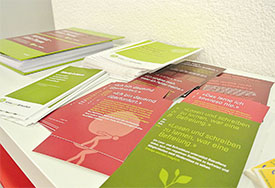
ABOUT THE PROJECT
The touring exhibition about literacy developed out of the 4 ½ year project “Raising awareness for literacy difficulties – for people who come in contact or work with weak performers in literacy”, which aimed to sensitise the public to the phenomenon of functional illiteracy (ended in Oct 2014). It took place in all of the three language regions in Switzerland and was delivered by the Association for Reading and Writing in German-speaking Switzerland (Verein Lesen und Schreiben Deutsche Schweiz). The touring exhibition is an outcome of this project and is now an ongoing offer.
Touring exhibitions have already taken place at such locations as job information centres, libraries, multigenerational houses, or just on the street for the general public.It was also part of the yearly conference on literacy in Switzerland.
TARGET GROUP
The touring exhibition is designed to inform people who come in contact and work with weak performers in literacy about the relevant issues of literacy, such as social workers, job centre staff, doctors, etc. and the general public. It indirectly aims at weak performers in literacy themselves. By enhancing the awareness of literacy difficulties in their environment, they will benefit from the touring exhibition as well.
AIM
The aim of the touring exhibition is to reduce barriers, taboos and prejudices in regard to poor literacy and to inform a wide range of different people about the topic. It arouses interest on the topic and the vital importance of literacy becomes visible.
Another aim is to show that writing and reading are highly complex skills which are hard to achieve and that the demand for writing and reading is much higher in today’s society than it was some decades ago.
METHOD/APPROACH
The touring exhibition is designed for indoor workshops and presentations. Interested persons or organisations can order it for free and can then inform people about literacy difficulties. The Association for Reading and Writing in German- speaking Switzerland offers the touring exhibition, postcards and brochures and a handbook to inform people about literacy difficulties.
The touring exhibition is an integral part of events where the Association for Reading and Writing in German-speaking Switzerland is raising awareness of difficulties in literacy. There, an expert presents issues concerning poor literacy using an accompanying PowerPoint presentation and the film “Boggsen” (http://www.boggsen.ch/) that informs about daily literacy difficulties many people encounter.
MPLEMENTATION/TRANSFERABILITY
The touring exhibition is an ongoing project as the costs for it are low once it is designed and produced. The idea can be easily transferred to other target groups and topics. As every interested person or organisation can order it and use it for events, it is designed to quickly and effectively inform a wide range of different people about the relevant issues.
WHY IS IT SPECIAL?
The touring exhibition is a flexible concept with low-threshold implementation, which can be utilised in various educational settings. It is a cost-effective way to raise the awareness of literacy difficulties.
CONTACT AND FURTHER INFORMATION
- Verein Lesen und Schreiben Deutsche Schweiz
Mrs. Aschwanden - ➜ dt-ch@lesen-schreiben-schweiz.ch
- ➜ www.lesen-schreiben-d.ch/sensibilisierungsprojekt.cfm
Copyright 2015 team training - Webdesign: Thomas Penka | Impressum und Datenschutz






